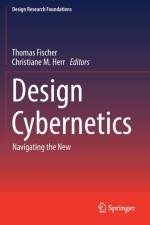- Navigating the New
1 477
Design Cybernetics: Navigating the NewDesign cybernetics offers a way of looking at ourselves - curious, creative, and ethical humans - as self-organising systems that negotiate their own goals in open-ended explorations of the previously unknown. It is a theory of and for epistemic practices (learning, designing, researching) that is deeply committed to the autonomy of others and hence offers no prescriptive methodology. Design cybernetics describes design practice as inextricable from conversation - a way of enquiring, developing shared understanding and reaching the new that harnesses reliable control as well as error and serendipity. Recognising circular causality, observer-dependency and non-determinability, design cybernetics extends beyond tenets of scientific research into the creative, ethical and aesthetic domain. From this perspective, design is not an ill-conceived subset of scientific research. Instead, scientific research emerges as a particularly restricted subset of the broader human activity of design.This volume offers a cross-section of design cybernetic theory and practice with contributions ranging across architecture, interior lighting studies, product design, embedded systems, design pedagogy, design theory, social transformation design, research epistemology, art and poetics, as well as theatre and acting. Addressing designers, design educators and researchers interested in a rigorous, practice-based epistemology, it establishes design cybernetics as a foundational perspective of design research. "This is a conceptually elegant, well structured, and comprehensive presentation of design cybernetics. It fills a gap in the literature of the field."Ken Friedman, Chair Professor, Tongji University "This book offers a valuable and timely introduction to second-order cybernetics as society grapples with complex issues like climate change and rising inequality."Joichi Ito, Director of the MIT Media Lab






